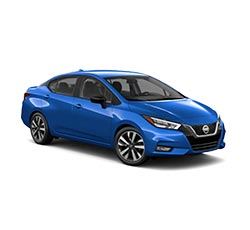2021 Nissan Versa Pros vs Cons. Should You Buy?
For the past decade, the Nissan Versa has been hailed as one of America's least expensive cars. Priced with an MSRP starting below most of the competition, the Versa is targeted toward buyers on budgets. But is it really something worth investing your heard-earned money in? The 2021 Nissan Versa, which is practically identical to last year's model, comes with a decently sized trunk and a solid fuel economy. But some buyers might have a tough time getting past its lack of small item storage and sluggish acceleration. Is it going to be the vehicle for you? Read on to learn more and see if the 2021 Nissan Versa might fit your needs.
What's New for 2021?
Nothing has changed for 2021 since the 2020 line-up saw a total overhaul for the Nissan Versa. The 2020 Versa received updated interior and exterior styling elements, even more available safety features than before, and an upgraded engine with a bit more power. Also, the Versa Note hatchback was discontinued in 2020 and will not be returning in 2021.
Top 10 Reasons to Buy a 2021 Nissan Versa – The Pros
1. Numerous Safety Features
One of the biggest lures for buying the 2021 Nissan Versa is that it offers a ton of standard safety features for the price. The Versa gives drivers driver aids like forward collision warning with an automatic emergency braking feature, rear automatic emergency braking, a warning for lane departure, a rear-view camera, and automatic headlights. If you upgrade to the SV trim level, you get blind-spot monitoring tacked on along with rear cross traffic alert. The SR Convenience package on the line-topping SR trim level adds adaptive cruise control if that is a feature you want to have equipped.
2. Cargo Space
The 14.7 cubic feet of cargo space that you get behind the Versa's rear seats is more than what most of its competitors offer. You can max it out by releasing the rear seats and folding them down. The cargo floor is actually quite low for a sedan, which is helpful when you need that extra volume for bulky items. The seats don't fold down totally flat, but they will go down easily.
3. Minimal Options Make For Easy Choices
You only get to choose from three trim levels on the 2021 Nissan Versa: the S, SV, and SR. Only the SR comes with an optional package, the SR Convenience package. This package adds on features like adaptive cruise control and heated front seats - things that are nice to have but that you can certainly live without. The fewer options you have make for more affordable trim levels and easier decision-making processes.
4. A High Fuel Economy
The Nissan Versa's excellent fuel economy is another strong point. The CVT helps the standard 1.6-L 4-cylinder engine get 35 mpg combined (with 32 mpg in the city and 40 mpg on the highway). For a non-hybrid vehicle, that is an impressive showing, and real-world tests back up these estimates. The Versa has actually been shown to get up to 41 mpg combined in real-world testing, which is a best-in-class performance.
5. The Infotainment System is User-friendly
Looking for an infotainment system that has a short learning curve and crisp, easy-to-read graphics? Nissan Connect is one of the better infotainment systems on the market right now, and its user-friendly nature is evident from the get-go. You can also easily pair up your smartphone with Apple CarPlay or Android Auto and utilize the touchscreen to get to your phone's apps. The system quickly responds to your inputs.
6. Solid Handling Capabilities
Handling is a strong suit for the Versa. While rounding through turns, the Versa's body stays composed, never exhibiting any body roll. It might not be the most thrilling ride, but it feels composed and secure with the tires staying planted. In terms of driving performance, this is where the Versa gets high marks.
7. The Zero Gravity Seats
Nissan added the Zero Gravity seats to the Versa for the 2020 overhaul. They can feel pretty firm, and the ones in the SV trim level have a nice cloth trim on them. For average drive times, they offer a good amount of lateral support.
8. Easy to Get In and Out
Getting in and out of the 2021 Nissan Versa is relatively easy for most people. The door sill openings are wide and tall enough, and drivers can easily adjust their seat to find the right driving position. You can take the seat up to the highest driving position and still have plenty of space left around your head, which makes the cabin feel cavernous. It is also helpful while getting in and out so that you do not end up bonking your head.
9. Helpful Driver Aids That Aren't Intrusive
Nissan equips the Versa with a lengthy list of standard driver aids, and most of them are relatively noninvasive. The short series of beeps from the forward collision warning is straightforward and not obnoxious. Lane keep assist has a low-level buzzing noise that won't bother most drivers even though it is noticeable - just as it is meant to be.
10. Easily Accommodates Child Safety Seats
Child safety seats can easily be installed thanks to the easy-to-access LATCH system in the rear seats. Even bulky rear-facing child seats can be slid in and out of their bases without a hassle. Having that much space to get them through the door and into the cabin is key, so the Versa's cavernous interior should really please parents with young children who have to sit in car seats.
Reasons Not to Buy a 2021 Nissan Versa – The Cons
1. No Onboard Navigation
Onboard navigation is not even an option on the line-topping trim level for the Versa. This is something that Nissan leaves off its cheaper vehicles, which we assume is a cost-cutting method. However, we think it is just silly. Making built-in navigation an option (at the very least) could attract more buyers to the higher trim level and would show that Nissan is actually focusing on the future instead of being stuck in the past.
2. Lacks Small Item Storage Space
Looking for a place to stash that tablet? Good luck finding a spot. Need to hide two smartphones in the optional (yes, optional) center bin? You won't be able to unless they're super-tiny flip iPhone 5s models. Seriously. That's how little space you get to store your small items inside of the Versa. Practical, it is not. We would like to see more spacious bins and door pockets, plus more shelving on the center stack for organization. Rivals like Honda have it down to a science, but Nissan underestimates how important storage space - and practicality in general - is to buyers.
3. Slow to Accelerate
The 2021 Nissan Versa's 1.6-L 4-cylinder engine is despairingly underpowered. Paired up with the CVT, it only gets 122 hp and 114 lb-ft of torque. That simply is not enough to get this vehicle moving at a good clip. Trying to get the Versa up to speed on the highway is nothing short of a challenge. Trying to pass another vehicle or pulling off at a swift pace? Not going to happen. Just forget about it. The Versa is not made for that kind of driving. It is oriented toward ultra conservative driving styles.
4. A Below-average Ride Quality
Along with its poor driving performance, the Versa's ride quality is not as smooth as what you get from its rivals. If you are on a smooth enough road surface, the ride feels fine enough, but once you get onto loose gravel or any type of bumpy surface, forget about that comfy ride quality. You will feel every. Single. Bump. The suspension just cannot dispatch them before the make their way into the cabin.
How It Stacks Up to the Competition:
2021 Nissan Versa vs. 2021 Hyundai Accent
The 2021 Hyundai Accent offers a top-notch ride quality with a cabin that remains quiet regardless of what speed you are going. High-quality materials mean that the cavernous interior is free from rattles and rolls. Also, the Accent delivers some superb real-world fuel economy numbers. The downsides? The Hyundai Accent has cloth seats that are notorious for trapping heat on hot days. The USB ports also struggle with charging even a smartphone. On top of that, the advanced safety aids get relegated to the highest trim level, meaning that you have to spend more to get more, whereas you do not necessarily have to do that on the Versa.
2021 Nissan Versa vs. 2021 Mitsubishi Mirage G4
The 2021 Mitsubishi Mirage G4 is the sedan version of the Mirage and offers some of the most generous warranty coverage in the industry. It comes equipped with a CVT that helps it get some amazing real-world fuel economy numbers, making it quite the rival for the Nissan Versa. And it is priced to compete with the Versa. But there are some cons to buying the Mirage G4. Its acceleration is painstakingly slow, and the engine is excessively loud and obnoxious. You also get a ton of road noise that comes in when you drive along at highway speeds. On top of all of that, the interior comes off as being much cheaper - and by cheaper, we mean tackier - than the Versa's. It seems like Mitsubishi just slapped some materials together and hoped they might hold together. But they kind of don't since even the fabric for the trunk will snag on cargo items. Um, yikes.
Conclusion
The 2021 Nissan Versa is a vehicle that benefited dramatically from its overhaul last year. The upgrades made to it have helped this year's line-up compete with the likes of the Hyundai Accent. While we think that many drivers will still opt for the less affordable, more feature-rich vehicles with higher-powered engine options, the Nissan Versa is a good alternative for those looking to save some money while getting something that provides a good return on fuel.
• 2021 Nissan Altima Pros VS Cons
• 2021 Nissan Armada Pros VS Cons
• 2021 Nissan Frontier Pros VS Cons
• 2021 Nissan Leaf Pros VS Cons
• 2021 Nissan Maxima Pros VS Cons
• 2021 Nissan Murano Pros VS Cons
• 2021 Nissan Kicks Pros VS Cons
• 2021 Nissan Rogue Pros VS Cons
• 2021 Nissan Rogue Sport Pros VS Cons
• 2021 Nissan Sentra Pros VS Cons
• 2021 Nissan Titan Pros VS Cons
• 2021 Nissan Titan XD Pros VS Cons
• 2021 Nissan Versa Pros VS Cons


